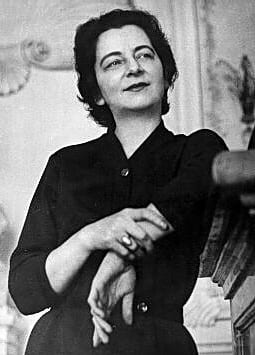The San Francisco Symphony Orchestra presented two concerts last weekend that opened with Overture for Orchestra, a brief and brilliant 1943 composition by Grażyna Bacewicz (1909-1969). Bacewicz—a virtuoso violinist and excellent pianist—showed her very best neo-classical side in this compact, six-minute-long work. Effective and challenging string writing coupled with bright woodwinds and brass passages dominate most of the Allegro movement. The frenetic pace of layered orchestral ostinatos vanish only temporarily in a short central episode marked Andante, where calmer pacing and longer woodwind lines predominate.
This curtain-raising opener provided an excellent introduction to the rest of the SFSO program, conducted on this occasion by Gemma New—the artistic advisor of the New Zealand Symphony and music director of Canada’s Hamilton Philharmonic Orchestra. Pablo Ferrández was soloist in Edward Elgar’s Cello Concerto and Felix Mendelssohn’s Symphony No. 3 “Scottish” rounded off the program. The concerts were held at San Francisco’s Davies Symphony Hall on Friday, May 10 and Sunday, May 12.
The two San Francisco concerts—with their “stirring performance” of Bacewicz’s Overture, as reported by one of the PMC’s friends in the Bay Area—provide a good segue for a discussion of some of the recently-issued recordings of Bacewicz’s orchestral music.
Bacewicz On Chandos Records
The new album Bacewicz – Orchestral Works, Vol. 1 (CHAN 5316) includes Bacewicz’s Symphony No. 3 (1952) and Symphony No. 4 (1953), the latter dedicated to Bacewicz’s close friend and a devoted champion, conductor Grzegorz Fitelberg (1879-1953). These two substantial works (about 30 and 25 minutes long, respectively) for a large orchestra are rounded off on this recording by Bacewicz’s Overture, and are performed by the BBC Symphony Orchestra under the baton of Sakari Oramo.

Recorded in February 2023, this disc was released by Chandos last November and elicited much praise in a review published a few months ago under the title “Bacewicz: Symphonies 3 & 4 album review—Oramo is a passionate advocate” in The Guardian. After praising Bacewicz for her “elegant neoclassicism” and noting that, “[…] Her handling of the large-scale four-movement forms is wonderfully assured, while the moments of high dissonance suggest that even in the early 1950s she was not prepared to conform to the precepts of Soviet populism as meekly as the authorities might have liked,” the Guardian article ends on the following observation:
Certainly, the drive and conviction behind these performances suggest that Oramo believes passionately in the music’s worth, and the BBCSO revels in its expert orchestration. It all promises well for subsequent installments.


Finally, a slightly less recent entry in Bacewicz’s discography on the Chandos label is the 2022 album Ysaÿe/Enescu/Bacewicz: Works for Strings (CHAN 5325). It comes courtesy of Maestro John Wilson and Sinfonia of London, who recorded her 1948 Concerto for String Orchestra alongside George Enescu’s Octet for String Orchestra and Eugène Ysaÿe’s Harmonies du soir. Gramophone Magazine noted that Wilson and Sinfonia of London “… get to the heart of Bacewicz at her most strident and neoclassical,” while in his May 10 article in the “Lebrecht Listens” series, published perhaps in conjunction with the San Francisco concert, Norman Lebrecht commented on the recent wave of Bacewicz’s recordings in his article under a noteworthy title: “Two Releases Beg The Question: Is Grażyna Bacewicz The Next Mieczysław Weinberg?”
After musing on the complicated pronunciation of Polish names and arguing that after learning how to enunciate “Szymanowski” and “Paderewski,” the challenges of “Weinberg” and “Bacewicz” can be managed by the “non-Polophones,” Lebrecht’s attention turned to the slow movements of Bacewicz’s Symphonies:
[…] the Andante of the Third Symphony and the two Adagios of the Fourth are wonderfully introspective passages, a private zone where Bacewicz expresses dark and disturbing emotions. Alban Berg’s Lulu lurks somewhere in the score, as does Bartok’s “Bluebeard”, but the totality is pure Bacewicz. I cannot imagine why the BBC Symphony don’t perform these in the Proms.
Moving on to the recording by Sinfonia of London and John Wilson, Lebrecht favorably compares Bacewicz to works by Enescu and Ysaÿe also on this disc by stating:
John Wilson […] has paired Bacewicz’s Concerto for String Orchestra on an album with works by string composers Enescu and Ysaÿe. If I assure you that Bacewicz’s 1948 score comes out by far the most vibrant and vigorous you might start to believe, like me, that Grażyna is a frontline composer who demands to be heard now and forever. Once more, it’s the quiet Andante that grips the attention, but the full 13 minutes is a musical world entire and it’s one you will surely want to explore.
Besides agreeing with Mr. Lebrecht’s conclusions, one might want to add that, in her oeuvre, Bacewicz is undoubtedly the pioneer of Polish neoclassicism. She remains well ahead of Weinberg’s achievements, whose reverence for his close friend and mentor, Dmitri Shostakovich, can be clearly heard and sometimes tends to obscure Weinberg’s own musical personality.
[Sources: sfsymphony.org, slippedisc.com, chandos.net, theguardian.com]
